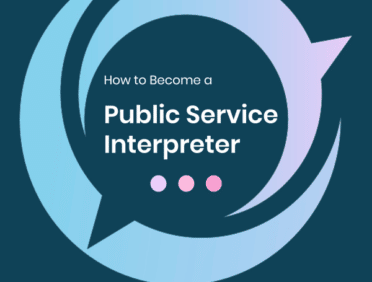If you are someone who speaks more than one language, then one career path that you can follow is to become an interpreter. An interpreter will take text or spoken words in one language and then translate them into another language.
Whilst this is sometimes something that happens with documents, this is usually more what a translator will do. An interpreter works as a live service that is offered to those who are listening to something in one language but who are not able to speak or understand that particular language.
There are lots of areas of life whereby an interpreter will be needed, and one example of this is education.
But why does education need interpreters, and how do you become one?
How to become an interpreter in education?
In order to become an education interpreter, you are going to need to have a high level of language skill in at least two languages (within the UK, this will usually be English and another language).
It is best if you have either studied interpretation at a higher educational level, perhaps taking a university degree or, if you have decided to take another path to this career, you may have actual work experience in the language that you wish to interpret.
If you have these skills and a level of understanding, then you will then be able to apply directly for an interpreting job in the educational institution of your choice.
In order to interpret something, then you need to be able to fully understand both of the languages that are involved when they are spoken to you or to someone else. Not only this, but you then need to be able to take those words and change them into another language, and relay the message to someone else.
An interpreter is someone who is able to convert free speech from the language that is spoken into an alternative language that the person who is a part of the conversation can understand. This may be simultaneous as the person is talking, or it may be during breaks in the conversation.
The approach will really depend on what is being said, the nature of the conversation and the person who requires the interpreting service.
What you need to become an interpreter
In order to become an interpreter within education, you are going to need to have a few different skills and attributes to allow you to be able to do the role to a high standard.
The first is to have foreign language skills; this could be in one particular language or perhaps in more than one language. You also, alongside this, need to have a good knowledge of the English language too.
If you have these basic skills, then you are already on your way to becoming an interpreter and can start out on this career path.
What language level do you need to be an interpreter?
In order to become an interpreter, you have to be fluent in at least one language, along with English. This is because when you are fluent in a language, you are going to be able to understand informal speech that may be used but not necessarily taught, and you will also have an understanding of the culture of the people who speak the language.
Key skills of an interpreters
Of course, the main skill that you are going to need to become an interpreter in education is to be able to speak more than one language. However, there are lots of other skills that you are going to need in order to become an interpreter of the highest standard.
Understand the nuances of languages
Part of interpreting is being able to understand some of the nuances of the language that you are speaking and interpreting. That way, you are going to be able to give the other person a proper interpretation of whatever it is that they need to understand and make sure that it is presented to them in a way that they will be able to understand. They need to understand
Remain calm under pressure
Interpreting spoken words can be a highly pressured thing to do. You are going to need to be able to understand what is being said and then turn it around to another language before presenting this to another person. This can be quite a quick turnaround, and you are not going to want to get it wrong, as this could cause some problems further down the line.
One of the simplest ways to ensure that this doesn’t happen is to remain calm, even when the situation is somewhat pressured.
Be an empathetic listener
If you are interpreting something for someone, then you are going to need to be as empathetic as possible. They may be in a somewhat difficult situation, or they may not entirely understand what is being taught to them. This can leave them feeling lost or confused.
If you can be empathetic, then they are going to feel much better about the situation that they find themselves in; they may relax and then be able to take in whatever is being taught to them much easier.
Good analytical skills
When you are interpreting something, you are going to need to be able to analyze what is being said ad what the key messages that need to be taken from this are. If you can identify this, then you are going to find it much easier to present those key messages to the other person.
This means that you need to be able to analyze the conversation and then turn it around into the key messages quickly and easily.
Competent with technology
Whilst much of the interpretation that you are going to do within education will be face-to-face, there is also a good chance that you will need to dial in virtually. This may be the case during a lecture or classroom setting, whereby your presence (and the delivery of what is being said) could be distracting for those around you.
Instead, you will listen to what is said online; then, you will be able to relay this back to another person, usually via a headset or headphones in their ears.
This means that you need to be able to understand the technology and be able to dial into calls with ease.
Understand nonverbal signals
Whilst much of interpretation is about the spoken word, it is also about what is not being said. This means that you need to be able to understand nonverbal signals as a part of the process.
Nonverbal signals are the use of body language, and they can often tell you additional things about the context of the conversation. Something that can be hard to pick up on if you are focusing intently on simply translating from one language to another.
Have a very good knowledge of grammar
Just because interpretations are usually verbal, that doesn’t mean that grammar isn’t going to come into play. It is important that, as an interpreter, you are able to understand grammar. Not only in the original language that is being spoken but also in the other language too.
Ability to respond quickly to changing situations
There is never a dull day when you are an interpreter. Therefore, you should be prepared to respond quickly to a changing situation. You need to be flexible, and you need to be able to move quickly whilst still remaining as calm as possible too.
Career path and progression
For the most part, you will be a freelance interpreter who will take on clients or projects as a part of your service. However, there are also times when you may be employed by an educational institution to provide interpreting services. This will usually be in areas that have lots of people who may require you to translate what is being taught to them.
Once you become an interpreter, you can choose to set up your own agency, whereby you have other interpreters who work as a part of your business, and you oversee the work that they take on.
Another possible career progression track that you may then take is to become a teacher. However, you are going to need to have another specialism that will allow you to teach.
How can you find good work
The internet is a great place to look for an interpreting job that you may be able to apply for. You may also be able to join social media groups and networks that are designed to help you to find the right interpreting jobs.
Where can an education interpreter work?
When you are an education interpreter, there are a variety of settings that you can work in. These could be schools or perhaps even universities. There is also a chance that you may work within a certain additional education setting, such as those that help people to find work or to develop their professional skills and improve their job prospects.
Keeping your skill up-to-date
One of the main things to remember about being an interpreter is that you are going to need to work on your skills on a regular basis. Else you can become rusty and may not be able to do your work as effectively.
Not only should you work on your language skills, but it is also important to work on the other skills that make you a high-quality education interpreter.
In order to be the best that you can be, it is important to complete interpreting training. This will help you to be able to upskill yourself and deliver the very best service to those that you work with.
To download a .pdf of this blog, please click here












